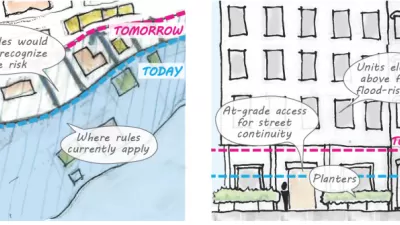New research suggests that real estate values were declining before prices started falling, but a climate-driven housing crisis could already be here in coastal Florida.

Christopher Flavelle reports on the plight of the real estate market in Florida, which is slowly starting to show signs of awareness about the effects of climate change and sea-level rise.
Central to Flavelle's reporting is a report published yesterday by the National Bureau of Economic Research that finds a real estate market waking up to the risk of sea-level rise (SLR in the following passage). From the study's abstract: "From 2013-2018, home sales volumes in the most-SLR-exposed communities declined 16-20% relative to less-SLR-exposed areas, even as their sale prices grew in lockstep. Between 2018-2020, however, relative prices in these at-risk markets finally declined by roughly 5% from their peak."
Flavelle's summary of the report's findings read thusly: "The authors argue that not only is climate change eroding one of the most vibrant real estate markets in the country, it has quietly been doing so for nearly a decade."
According to the article and the study, the decline of Florida's coastal real estate market started in 2013, but no one noticed.
The focus on Florida's coastal real estate market follows shortly after a similar article detailed the effects of climate change-induced flood risk on the real estate markets of the coastal Carolinas.
FULL STORY: Florida Sees Signals of a Climate-Driven Housing Crisis

Planetizen Federal Action Tracker
A weekly monitor of how Trump’s orders and actions are impacting planners and planning in America.

Congressman Proposes Bill to Rename DC Metro “Trump Train”
The Make Autorail Great Again Act would withhold federal funding to the system until the Washington Metropolitan Area Transit Authority (WMATA), rebrands as the Washington Metropolitan Authority for Greater Access (WMAGA).

The Simple Legislative Tool Transforming Vacant Downtowns
In California, Michigan and Georgia, an easy win is bringing dollars — and delight — back to city centers.

The States Losing Rural Delivery Rooms at an Alarming Pace
In some states, as few as 9% of rural hospitals still deliver babies. As a result, rising pre-term births, no adequate pre-term care and harrowing close calls are a growing reality.

The Small South Asian Republic Going all in on EVs
Thanks to one simple policy change less than five years ago, 65% of new cars in this Himalayan country are now electric.

DC Backpedals on Bike Lane Protection, Swaps Barriers for Paint
Citing aesthetic concerns, the city is removing the concrete barriers and flexposts that once separated Arizona Avenue cyclists from motor vehicles.
Urban Design for Planners 1: Software Tools
This six-course series explores essential urban design concepts using open source software and equips planners with the tools they need to participate fully in the urban design process.
Planning for Universal Design
Learn the tools for implementing Universal Design in planning regulations.
Smith Gee Studio
City of Charlotte
City of Camden Redevelopment Agency
City of Astoria
Transportation Research & Education Center (TREC) at Portland State University
US High Speed Rail Association
City of Camden Redevelopment Agency
Municipality of Princeton (NJ)





























